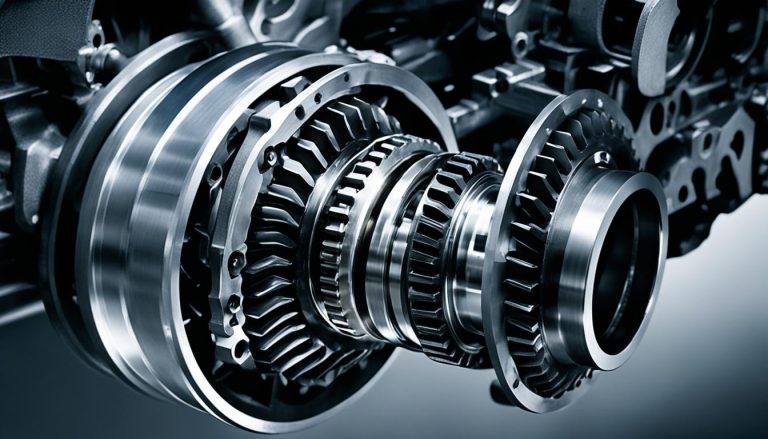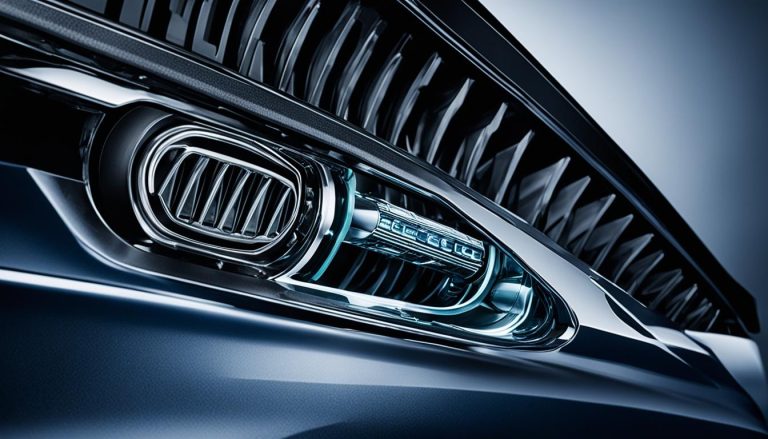Mustang GT Diff Troubles? Get Insight Now!
If you’ve been cruising in your Mustang GT and experienced that unnerving “tug” at highway speeds, followed by vibrations and the absence of any obvious “bad noises”, you’re not alone. It’s a scenario that can catch even the most seasoned Mustang enthusiast off guard. Picture this: you’re behind the wheel, the road ahead is clear, but suddenly, white smoke and a trail of black fluid break the calm, hinting at a potential differential nightmare.
It’s unsettling when your GT starts acting up, especially without any loud forewarnings. A specific case saw a 2011 Mustang GT leaving its driver puzzled by such symptoms—only to end up at the dealership unraveling a bearing failure within the differential. The comforting news? The necessary repairs were fully covered under warranty. Understanding Mustang GT differential problems, recognizing that ominous Mustang GT differential noise, and knowing when to seek Mustang GT differential repair can be the shield between you and a downed pony car.
Key Takeaways
- Identify potential differential issues early to avoid extensive damage.
- Unusual behavior without noise can still indicate serious differential problems.
- A leaking differential with black fluid and white smoke is a red flag.
- Dealership visits can confirm suspicions like bearing or differential failure.
- Warranty coverage can be a lifesaver for expensive differential repairs.
- Staying informed about your Mustang GT’s differential health is crucial.
Identifying Mustang GT Differential Issues
If you’re driving a Mustang GT with a limited slip differential, you’re already aware of the performance benefits it offers. However, even this robust system may encounter issues occasionally. Let’s explore how to troubleshoot limited slip differential problems, recognize the common symptoms, and understand the sounds and indications that your Mustang’s differential might be giving you trouble.
The Unmistakable Signs of Differential Failure
When your Mustang starts making unusual noises or you feel vibrations, these could be the early warning signs of differential failure. Paying attention to these symptoms can save you from a more serious mechanical breakdown in the future.
Understanding Differential Noise and Vibrations
One of the common problems with limited slip differentials in the Mustang GT includes a distinctive “clacking” sound. This noise often occurs during takeoff and while turning, suggesting that the clutch packs within the differential could be the culprits. Even absent any visible damage, these sounds shouldn’t be ignored as they can signify a need for troubleshooting limited slip differential issues.
Symptoms of Differential Trouble at Low and High Speeds
You may notice the clacking noise primarily during acceleration from a standstill, or when your Mustang GT takes a curve. These noises are often detectable only under load, and may not be present when the vehicle is lifted. It’s essential not to dismiss these sounds, as they are indicative of potential limited slip differential issues and should be addressed promptly.
| Issue | Low Speed | High Speed |
|---|---|---|
| Noise Type | Clacking or popping | Possible whining or howling |
| When It Occurs | Acceleration, turning | Constant, under load |
| Possible Cause | Clutch pack issues | Bearing wear, gear misalignment |
| Immediate Action | Inspect, diagnose | Inspect, possibly repair or replace |
If you’re experiencing any of these indicators, it’s wise to dive deeper into the health of your Mustang GT’s differential. Addressing these issues early can ensure smooth performance and a longer lifespan for your vehicle’s key components. Be proactive in troubleshooting limited slip differential issues to keep your Mustang GT in peak condition.
Limited Slip Differential Problems Mustang GT
If you own a Mustang GT, you’re likely aware of the importance of a properly functioning differential. However, when you start hearing a persistent “clacking” noise, it’s natural to suspect a clutch pack failure. But what if you’ve just had a Mustang GT differential replacement or serviced your clutch packs and the sound remains? It’s time to delve deeper into limited slip differential maintenance for your Mustang GT and uncover the true culprits that could be causing these sounds.
Unexpected noises don’t always originate from the most apparent sources. In some cases, the issue may lie not within the differential itself, but rather with related components. For instance, the exhaust system could be coming into contact with the car’s frame, a problem commonly due to worn rubber mountings. Such scenarios underscore the necessity of comprehensive inspections when maintaining your vehicle’s differential.
Below, we’ve compiled a comparative analysis to help you understand common reasons behind differential noises and guide you through their resolution:
| Potential Issue | Description | Maintenance Tips |
|---|---|---|
| Worn Clutch Packs | Typically causes a “clacking” noise when turning or accelerating from a stop. | Inspect clutch packs for wear; replace if necessary with quality parts. |
| Exhaust System Contact | Noise may occur if the exhaust system touches the vehicle’s frame due to worn rubber components. | Check and replace any degraded rubber mountings to prevent contact. |
| Differential Bearings | A worn bearing may produce a whirring or growling noise, noticeable at various speeds. | Arrange for a thorough inspection and if needed, a bearing replacement. |
| Loose Mountings | Vibrations or noises can occur if differential mountings become loose. | Ensure all mountings are secure; replace any damaged hardware. |
While differential problems can present challenges, regular limited slip differential maintenance for your Mustang GT and timely repairs are critical to your vehicle’s performance and lifespan. If you ever encounter issues with your differential, consult a trusted mechanic who specializes in Mustang GTs to diagnose and address the problem accurately.
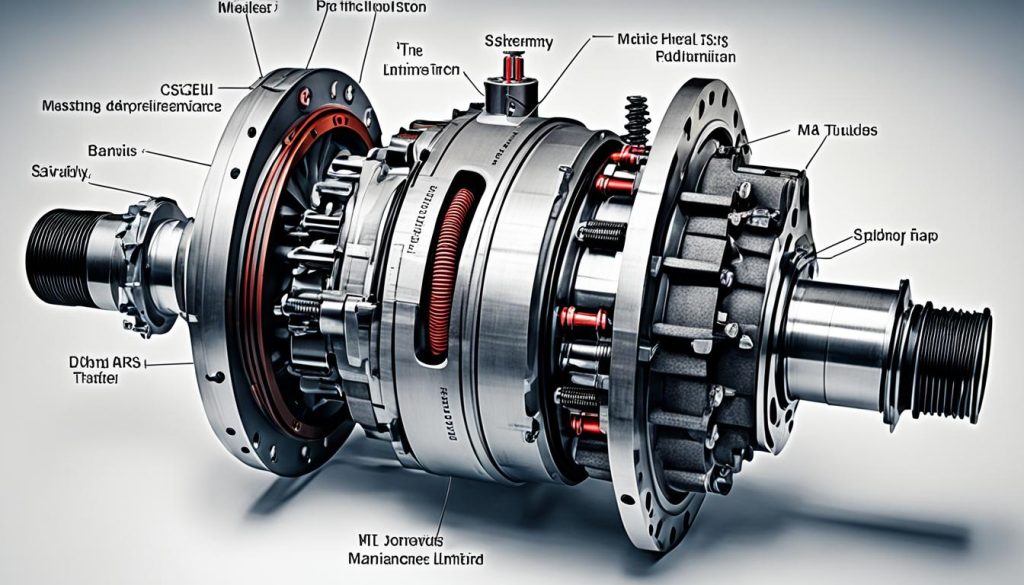
Common Problems With Limited Slip Differentials in Mustang GTs
If you’re hearing that telltale Mustang GT differential noise or suspect you’re facing limited slip differential problems with your Mustang GT, you’re not alone. An understanding of the common issues these mighty muscle cars experience can help you diagnose and address problems before they lead to serious damage.
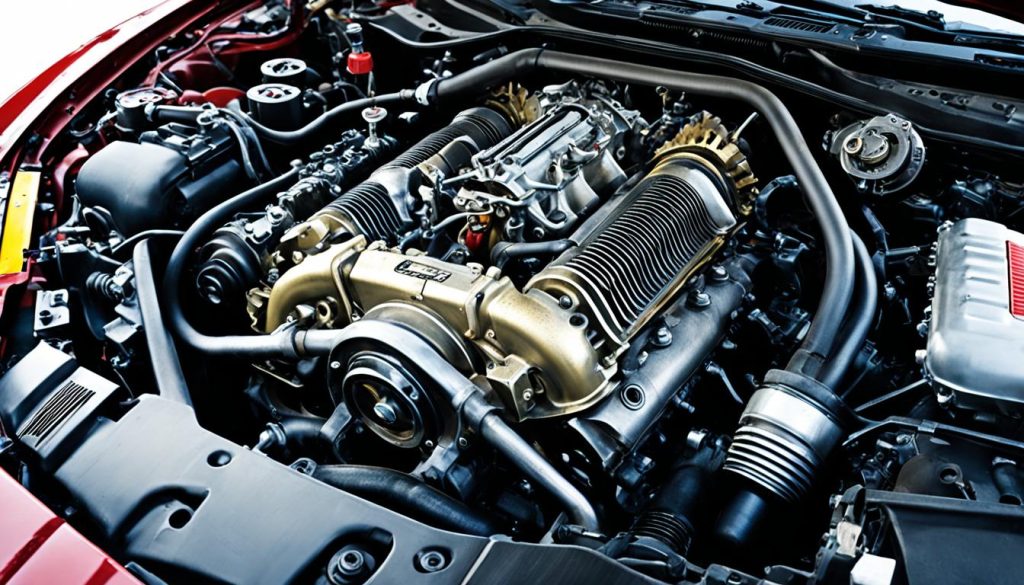
Knowledge is power when it comes to car maintenance, so let’s dive into the intricacies of the Mustang GT’s differential and identify the key problems that might be affecting your drive.
Clutch-Pack Failures and Their Impacts
Clutch-pack failure is a well-known issue that can cause a range of symptoms from noise to poor handling. If you’re experiencing difficulty with acceleration or notice your Mustang GT isn’t performing as smoothly as it should, these could be signs of clutch-pack wear or failure.
Debunking the Myths: Differential Wear and Tear
Not all noises coming from the rear of your vehicle are symptoms of differential wear and tear. Sometimes, the issue might be due to poorly fitted aftermarket parts, such as an exhaust system, that can produce sounds similar to a failing differential. It’s essential to consider all possibilities when diagnosing the problem.
How to Recognize Bearing Degradation in Your Differential
Metallic particles in your differential fluid is a red flag indicating bearing wear. Bearings are crucial to the differential’s operation, and their degradation can lead to Mustang GT differential noise and ultimately, differential failure.
| Problem | Symptoms | Potential Solutions |
|---|---|---|
| Clutch-pack failure | Noise during acceleration, handling issues | Inspect clutch packs, replace if necessary |
| Bearing wear | Metallic particles in fluid, whining noise | Replace bearings and flush differential fluid |
| Miscellaneous noises | Noises mimicking differential issues | Check for loose aftermarket parts, ensure proper installation |
By staying attentive to these symptoms and taking prompt action, you can mitigate limited slip differential problems in your Mustang GT and keep your ride roaring with power and precision.
Troubleshooting Mustang GT Limited Slip Differential Issues
When it comes to maintaining the peak performance of your Mustang GT, addressing limited slip differential issues is key. A systematic approach is imperative to keep your ride smooth and to ensure you’re not sidelined due to unforeseen mechanical hiccups. Whether you’re considering an ambitious Mustang GT differential upgrade or simply keeping your current system in tiptop shape, recognizing and tackling differential problems is crucial.
Step-by-Step Guide for Diagnosing Differential Problems
Embarking on the diagnosis starts with a comprehensive inspection. Not sure where to begin? Don’t worry. Check the rear end for wear on bearings and seals, assess the condition of carrier bearings, and confirm you’ve got fresh gear oil coupled with the right amount of friction modifiers. This intricate dance of components ensures your differential operates smoothly, mitigating those dreaded Mustang GT limited slip differential issues.
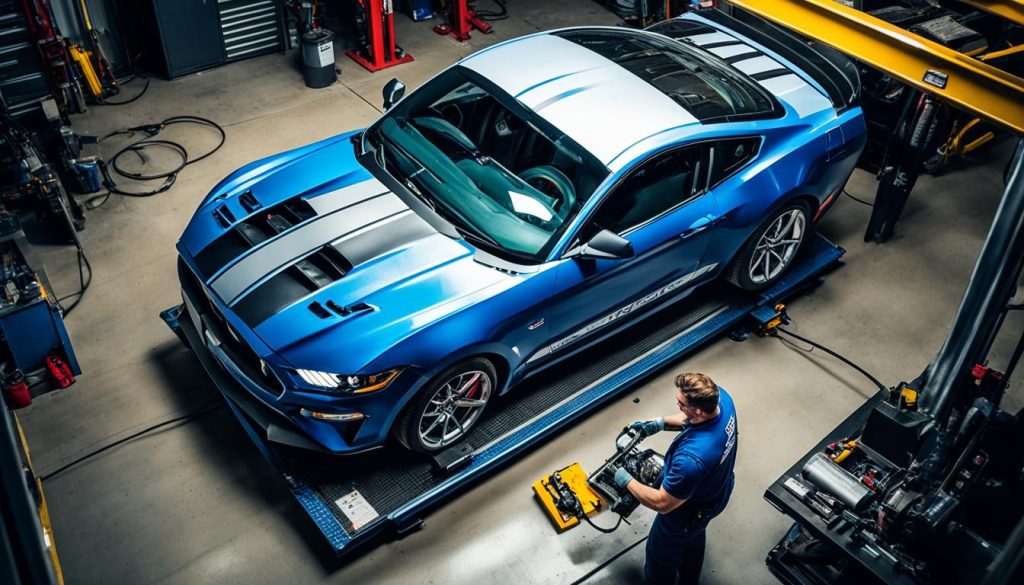
The Role of Gear Oil and Friction Modifiers in Differential Health
You’ve heard it before: oil is the lifeblood of your vehicle’s mechanical components. The same goes double for your differential. The wrong type or old, degraded gear oil can lead to inadequate lubrication. Add friction modifiers to the mix, and you’re looking at a pivotal element for troubleshooting limited slip differential issues in your Mustang GT. Remember, these aren’t just any additives; they are tailored to make that clutch engagement smooth and quiet.
Tackling the Challenge of C-Clip and Axle-Related Dilemmas
It’s the small parts that often lead to the biggest headaches. Say, for instance, your C-clip seems to be the source of your sorrows. Incorrect stack height during clutch pack installation could be the underlying mischief-maker. It’s a delicate balance—one that, when maintained, can prevent noises and ensure the integrity of your differential engagement.
| Component | Checkpoints | Common Issues | Troubleshooting Tips |
|---|---|---|---|
| Bearings and Seals | Wear, Leakage | Whirring sounds, fluid on the ground | Inspect regularly, replace as needed |
| Carrier Bearings | Condition, Free Play | Noise under acceleration or turning | Verify tightness, replace if worn |
| Clutch Packs | Stack Height, Wear | Chatter or vibration during turning | Ensure correct installation, consider upgrade |
| Gear Oil & Friction Modifiers | Quality, Quantity | Limited slip differential issues, clutch wear | Change oil regularly, use specified products |
| C-Clips | Fitment, Condition | Noise seemingly from differential | Check for proper installation, replace if necessary |
Maintaining Your Mustang GT’s Differential for Performance and Longevity
For muscle car enthusiasts, the Mustang GT represents not only a symbol of raw power but also a commitment to ongoing maintenance and upgrades. Keeping your Mustang GT’s differential in top shape is paramount for both performance and longevity. Let’s dive into understanding when a repair might suffice and when to consider a complete replacement.
Mustang GT Differential Repair Vs. Replacement Scenarios
Should you find your Mustang GT’s differential in need of attention, assessing whether to repair or replace can be influenced by various factors. Mustang GT differential repair is often viable when dealing with specific component failures such as bearings or seals, which can be addressed without overhauling the entire system. Conversely, a Mustang GT differential replacement might be a smarter economic and performance choice, particularly if your differential has sustained significant damage or is showing signs of chronic wear.
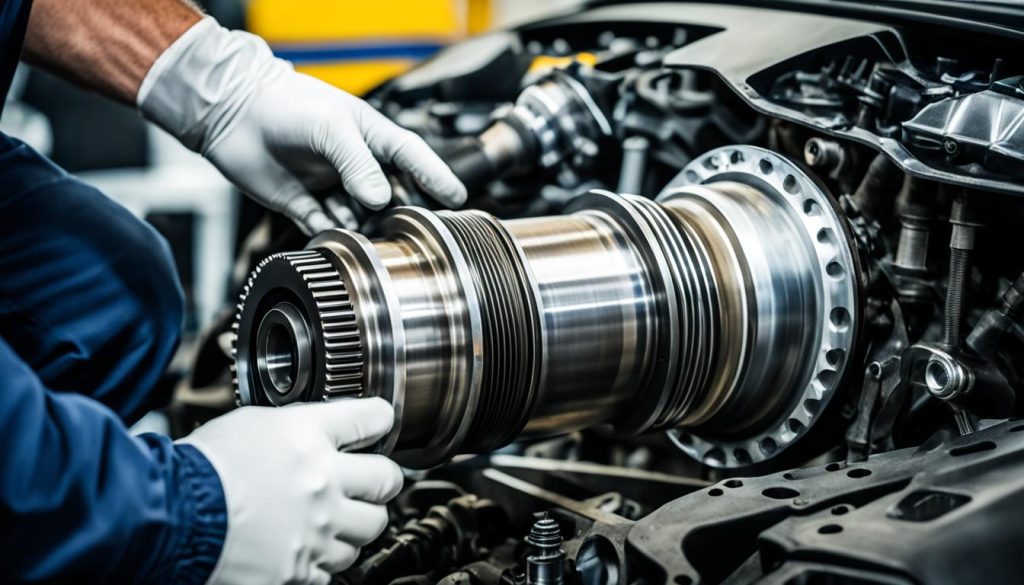
Preventative Maintenance Tips for Your Limited Slip Differential
Routine maintenance is crucial for preserving the condition and function of your limited slip differential. Staying on top of limited slip differential maintenance Mustang GT involves regular inspections for wear and tear, timely replacement of worn-out parts, and ensuring the correct application of gear oil coupled with the right friction modifiers. Such proactive care can prevent costly repairs down the road.
Upgrading Your Mustang GT Differential for Better Performance
Whether you’re aiming to boost your ride’s performance or prepare for the race track, considering a Mustang GT differential upgrade is a wise investment. Upgrades often include installing higher-quality clutches, ensuring optimal gear stack height, and even shifting to more enduring materials—innovations that not only enhance driving dynamics but also contribute to the differential’s durability.
Professional Insight on Differential Upgrades and Replacement
When it comes to enhancing the performance and reliability of your Mustang GT, considering a differential upgrade is a proactive step. Beyond boosting your car’s capabilities, an upgrade can actively prevent the distressing symptoms of differential failure, such as the unwelcome noise and vibration that can detract from your driving experience. Automotive professionals often steer Mustang owners towards a full bearing replacement if the component’s service life raises questions, ensuring longevity and peace of mind.
However, when facing a Mustang GT differential repair, it’s essential to weigh the costs and benefits of repairing your existing setup against a full Mustang GT differential replacement. Your decision should hinge on the fine balance between immediate costs and the anticipated performance benefits. Upgrades often involve high-quality components that may present an upfront investment but pay dividends in enhanced drivability and component endurance.
Before committing to any work, a comprehensive inspection is vital to isolate the true cause of your concerns. A meticulous examination by professionals will include a thorough assessment of not just the differential itself, but also related systems, such as the suspension and exhaust configurations. This holistic approach is critical to avoid misdiagnosing issues that merely mimic Mustang GT differential troubles. Armed with the right information, you can make an informed decision on the appropriate course of action to keep your Mustang GT’s performance at its peak.
FAQ
What are common indicators of Mustang GT differential problems?
Common signs of differential issues in a Mustang GT include unexpected vibrations, unusual noises such as clacking or whining, and in more severe cases, leaking fluids and smoke from the rear end. If you notice any of these symptoms, it’s crucial to inspect your vehicle or have it checked by a professional.
How do I identify if my Mustang GT is having differential noise or vibrations?
Differential noises can take on various sounds including clacking or whining, especially evident when accelerating from a standstill or making turns. Vibrations might be felt at specific speeds or conditions. It’s important to note the circumstances under which you hear the noise or feel the vibrations, as this information can aid in diagnosis.
What are the symptoms of differential trouble in Mustang GTs at low and high speeds?
At low speeds, you might hear clacking noises or sense the car behaving erratically when turning corners. At high speeds, symptoms can include whining noises, harsh vibrations, or even a tugging sensation, potentially accompanied by visible smoke or fluid leaks from the differential area.
What should I do if I suspect my Mustang GT has a differential or clutch-pack failure?
If you suspect a problem with your Mustang GT’s differential or clutch pack, the best course of action is to have your vehicle inspected by a professional mechanic. They can identify the specific issue, whether it’s worn clutch packs, bearing failure, or another differential component needing attention.
Could there be other issues mistaken for differential problems?
Yes, sometimes noises or sensations that seem like differential problems could be caused by other parts of the vehicle. For instance, components such as the exhaust system could make contact with the frame due to worn rubber pieces, mimicking differential noises. A thorough inspection should be conducted to rule out such possibilities.
How can I maintain my Mustang GT’s limited slip differential to avoid issues?
Regular maintenance is key to avoiding differential problems. This includes regular inspection of axle bearings and seals, using the correct gear oil with appropriate friction modifiers, and replacing worn parts promptly. Staying on top of these aspects can greatly extend the life of your differential.
What’s involved in upgrading my Mustang GT’s differential, and is it worth it?
Upgrading your differential can involve installing higher-quality clutch packs, better bearings, and ensuring proper gear stack height, among other improvements. Whether it’s worth it depends on your performance needs and whether you’re experiencing recurrent issues with the factory differential setup. An upgrade can enhance performance and reliability.
When should I consider replacing rather than repairing my Mustang GT’s differential?
Consider replacing your Mustang GT’s differential if the cost of repairs is high relative to the value of a new unit, if the differential has severe damage or if there’s a pattern of recurring problems. A replacement may offer a more dependable, long-term solution.


